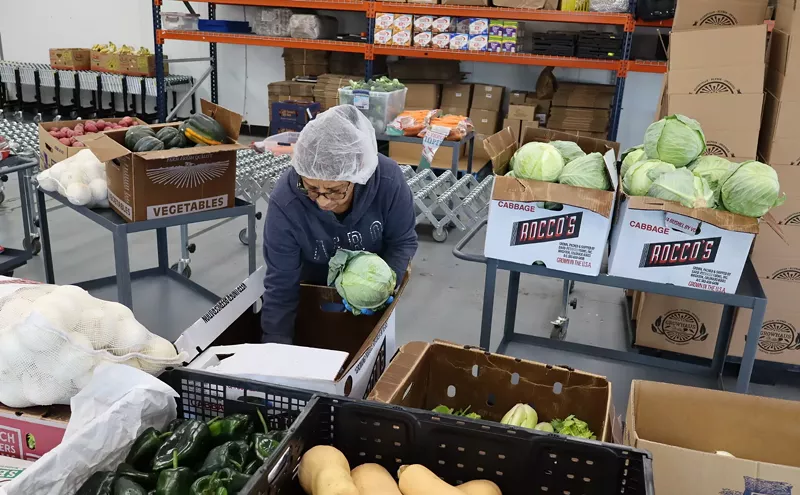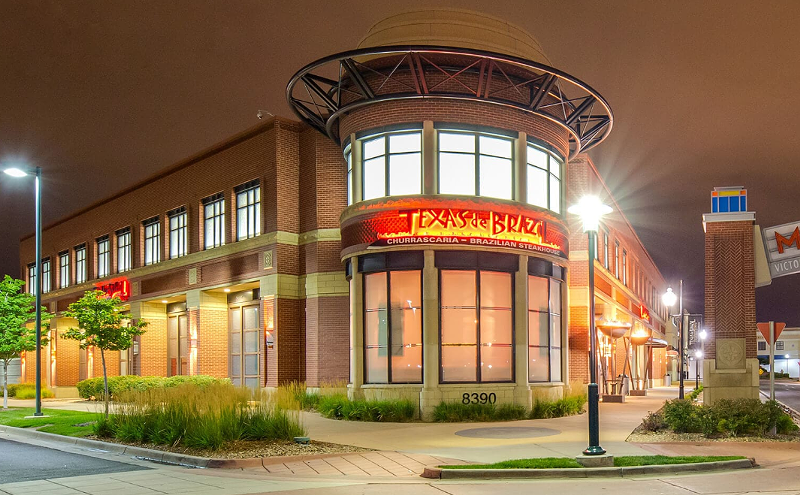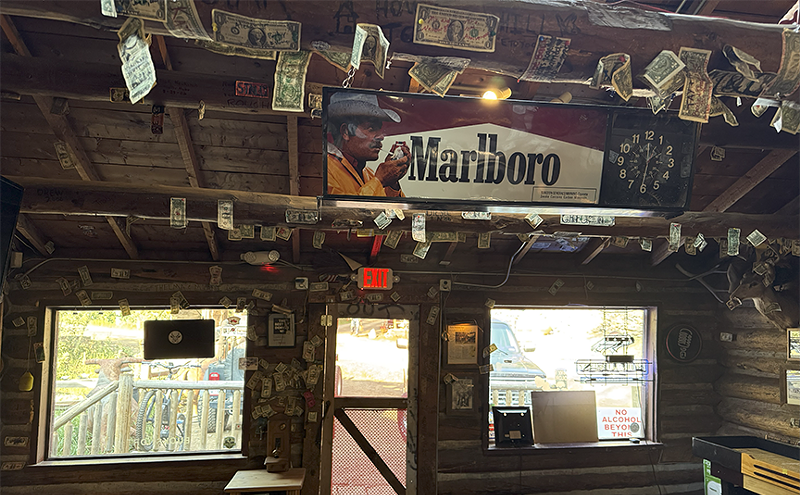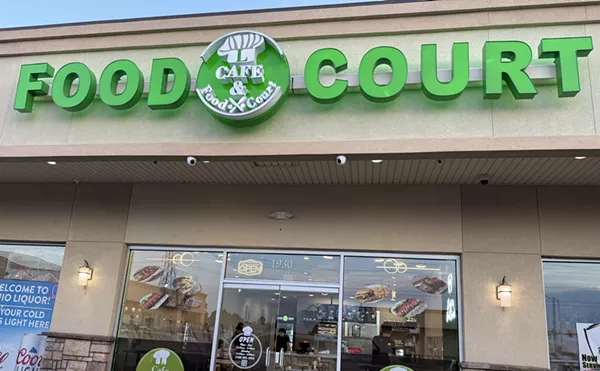But Dario's isn't busy. Scattered deuces and a four are stretched across the deep, narrow dining room in an attempt to make the place appear more crowded, but it's not working. The handful of occupied tables only point up the gulfs between them where no one is sitting -- like merry-go-rounds with no riders. Atoms with empty valences. The quiet is heavy, brooding. An older woman, almost certainly the owner, sits at a table pressed up against the front window, looking out into the dark, through the watery glare of headlights passing on 17th Avenue, waiting for customers who obstinately refuse to come. It's a deathwatch, this dinner. A wake, albeit a very well-catered one.
My presence isn't helping matters any. In a busy restaurant, a man eating alone is an anomaly, but an interesting one. Businessman, maybe, or a stood-up date. But here -- despite the warmth of my custom and the weight of my trade -- my solitary state is only adding to the sense of desolation. It's an exponent to the sadness of a house that's fallen off the radar of the Denver food scene, lost in the scrum of new openings and name chefs, victim of the hurly-burly pit fights of dueling PR agents. Curious that the sound most associated with a hot restaurant -- the bang and clatter of the kitchen's batterie de cuisine, the hiss of wine in hot pans -- and the sound of one back on its heels is almost the same. At Dario's, the dining room is so bare of conversation that you can hear every spatter and clank from the galley.
Dario's deserves much better. Despite the quiet, the servers are happy, swanning between tables with smiles for every customer. The music filling the empty spaces, bridging the long lags in dialogue, is an upbeat mix of cafe standards, coaxing and goading a thin sort of joy into the air -- the undeniable, antique happiness of Sinatra and his pals. And on the board are a dozen specials, good ones like puttanesca, rustica and pollo bianco, that stand, somehow nobly, as a hedge against the winning world of seared ahi tuna appetizers, nouveau smart-ass gelees and strangled squab in styrofoam jus.
I spend this rainy Saturday night eating Caprese salad with squeaky-fresh mozzarella and sweet basil, and minestrone soup that's a thick, spicy mess of potatoes and carrots, pasta, tomatoes, herbs and beans; a slow-simmered catch-all of everything in the kitchen cooked so long that the flavors have taken on an almost archaeological strata of built, freshened and rebuilt tastes. It tastes the way minestrone is supposed to taste when it's been simmering low on the stovetop for a day, maybe two, maybe three, which is the time it takes to do it right. And despite the lack of audience, Dario's cooks do it right anyhow. They make their own everything (except the bread, which is dry and awful, and the spumoni, which isn't), even though it would certainly be easier and more cost-effective to buy frozen bricks of soup to be thawed for service or mass-produced cannoli in a box. But that would also be wrong, antithetical to the point of running a restaurant in the first place. The cooks cook because that's what kitchens are made for, regardless of whether anyone's there to notice.
I eat veal saltimbocca with a side of spaghetti in a simple red sauce that tastes like the red sauces most kitchens west of Chicago seem incapable of making -- a meat base, easy on the spice rack, blunt sweetness of tomatoes and nothing else. Not a mother sauce, but a grandmother. The veal is sweet and delicate, pounded tender, breaded thinly (another trick of milk and flour that cooks seem to have lost somewhere along the way, gone missing in the gaps between the classical canon and today's dissonant experimentalism), then veiled with prosciutto cut a bit thick for my taste and a cap of mozzarella. It's not the best saltimbocca I've had (too heavy on the rosemary and covered with button mushrooms), but it's good. There's sage in it, which is nice, and the near-citric bite of a white-wine sauce to cut through the heaviness of the meat and cheese.
The picatta has a muscular sauce of lemon butter that's a pleasant change from the castrated nip I've become accustomed to, and briny capers that burst like little exclamation points across the smooth solidity of the veal. From the specials menu I try Nero's crab cake -- a huge thing, the size and thickness of a hockey puck, a plain blend of flaked crab, a light touch of spices and breadcrumbs, fried brown in spicy butter. The Swiss lasagna isn't. It is lasagna, and a specialty of the house, but is made Italian -- though more French, really -- by the inclusion of a besciamella white sauce. Let the Swiss stick to their cheese and their watches. The Italians have lasagna covered.
I finish, take a cannoli and an order of scampi provençal to go, and I eat them before I start the car. Like the lasagna, the scampi isn't scampi or provençal; it's shrimp in a beurre blanc sauce (heavy on the garlic, onions instead of shallots) over pasta, simple enough, but unbalanced and a little oily. The cannoli is great -- crispy-soft shell, smooth, barely sweet cream filling studded with chocolate. The kitchen makes these every day, and I wonder how many are tossed at the end of a Saturday. How early do the cooks come to start prepping for a rush that never arrives?
I listen to Boulder's Ars Nova singers on the radio and the rain on the roof while I eat, thinking that if anyone were to make a movie in Dario's, this music -- forty-voice harmony singing Striggio's Ecce beatam lucem in Latin -- would be the best accompaniment. There's such a high, bright joy in it, such a sadness, such a sense of emptiness filled by voices. Though I can't understand the words, I know they're beautiful and old and lonely and full, all at the same time.
On Monday night, Dario's is even slower, but the smell that hits me as I walk through the door -- the garlic and onions and red-sauce smell of a kitchen hard at work for a roomful of ghosts -- is like coming home. I bring a friend, the friend brings her baby who's not yet a year old and so won't be ordering anything, and we're it. The only table at six o'clock. We eat calamari antipasti -- rings of squid stuffed with a gentle, savory paste of shrimp, vegetables and bread crumbs, served in a tarn of red sauce kinked a little spicy, more marinara than tomato gravy, to match the languid fishiness of the squid.
My friend has the kid in her lap, playing with a spoon. We trade her back and forth, one amusing the child while the other eats, and then the waitress asks if we'd like her to watch the child for a few minutes so that we can both eat while the food is hot. "It's no problem," she says. "It's not like I have much else to do."
We move through another round of soups and salads, then onto entrees. There's chicken paprika -- a smoky, earthy sauce of Hungarian extraction over chicken of no particular origin, heavy on the paprika and not much else, which is stunning to the palate at first, blunt as a club, but grows on you over time, mounting layers of that rough, sandpapery spice on top of chicken and black pepper and other diffuse elements whose flavors don't have easy names. Cedar. Black earth. Wood smoke.
"I'm going out back to have a cigarette," says a much younger man, buttoned down in a white shirt, who's been sharing the table by the front window with the older woman tonight. "Maybe that'll bring in some customers." She waves him off with a hand, never taking her eyes off the street.
I eat cioppino, a monstrously huge portion of a half-dozen different shellfish: black mussels, greenlips, little brown and white stripey things that I can't place but taste so fresh and live that swallowing them is like a tiny mouthful of ocean, plus shrimp, plus scallops, all piled into a mountain of excess above a red sea of marinara broth that's like tomato soup roughed up with oregano, pepper, onions and seawater. It's a mark of honor that this kitchen, struggling as it must be, is still generous and does not skimp or go tightfisted with the goods. Dario's gives everything it has, even if what it has isn't much. This is one of the better cioppinos I've tried, one of those dishes that makes you want more, even though you know you can't finish what's in front of you.
The younger man comes back in through the back door. He smiles as he passes our table, the smile not forced at all, but it fades fast. "Well, they sure have more than we do," he says, answering a question that I can't hear from our table in the back of the dining room. But I can guess at it. Dario's is surrounded by other restaurants and bars. We can hear the crowd at the Thin Man through the walls.
Above us, the radio is playing Sinatra, Sinatra and more Sinatra. Everything in the man's catalogue, apparently, and all overlaid by a layer of pops and static that makes it sound like the music is coming off an ancient Victrola that someone's stored in the back and fired up especially for this occasion. Around us, faded travel posters from Trentino and the Swiss Alps hang on white plaster over dark wood. The red-and-white checked tablecloths seem almost mockingly cheerful when they're on tables empty of anything else.
Around seven, another group finally comes in -- a six-top, big eaters all. And two people are sniffing around the menu posted outside. Things are looking up. Frank is singing It Was a Very Good Year, a lament to gone days and lost chances. Taking it as our cue, we pay our bill, thank everyone and go. Outside, the couple that was checking out the menu has moved on, and just as we get to the car, the rain starts up again.












